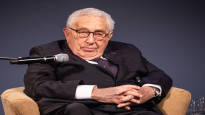The diplomat who exceptionally shaped US foreign policy was 100 years old when he died.
Former US Secretary of State Henry Kissinger is dead. The matter is reported, among other things, on Kissinger’s website. Kissinger was 100 years old when he died. He died Wednesday at his home in Connecticut.
Kissinger served as US Secretary of State from 1973 to 1977. He was the 56th foreign minister of his country.
Washington Post magazine describes Kissinger as having an unparalleled influence on US foreign policy Richard Nixon and Gerald Ford during presidential terms.
According to the newspaper, Kissinger has been the only person who has served as both the White House’s national security adviser and the country’s foreign minister at the same time. Because of this, he managed to control the country’s foreign policy in a way that only a president is usually capable of.
After leaving the US administration, Kissinger, who worked as a consultant among other things, expressed opinions that shaped global politics and business for decades.
An idealized politician accused of being a war criminal
Kissinger’s name was usually associated with the so-called realpolitik, with which the prevailing circumstances and practicality were emphasized in foreign policy, often ignoring matters of principle.
His way of promoting American interests was praised and compared to him by admirers Otto von Bismarck, Klemens von Metternich and of Armand de Richelieu to such great leaders in history.
Kissinger’s website in the published obituary, the former foreign minister is said to have played a key role in opening China to Western countries.
In addition, he is described as having been the main advocate for the détente between the United States and the Soviet Union, which eased tensions between the countries in the midst of the Cold War.
On the other hand, many, especially among the left, felt that Kissinger was a war criminal who had been left unindicted for his crimes.
He was criticized, among other things, for his role in the spread of the Vietnam War to two other countries, for supporting the 1973 military coup in Chile, and for giving the green light to Indonesia’s bloody invasion of East Timor in 1975.
Controversial Nobel Prize
Kissinger and Vietnam peace negotiator Le Duc Tho received the Nobel Peace Prize in 1973. The reason for receiving the prize was that they managed to initiate a ceasefire.
Awarding the duo was such a controversial decision that two members of the Nobel Committee resigned because of it.
Le Duc Tho refused the award, but Kissinger accepted it. However, he also refused to go to the award ceremony.
In 1975, Kissinger offered to return the award, but the committee refused.
Under the peace talks, Nixon and Kissinger had sought to strengthen US positions, and the two authorized the 1969-1970 bombings in Laos and Cambodia. The bombing killed thousands of civilians and indirectly led to the rise of the Khmer Rouge.
The bombings did not have the approval of the US Congress and were kept secret from the public.
